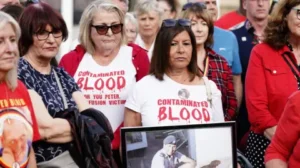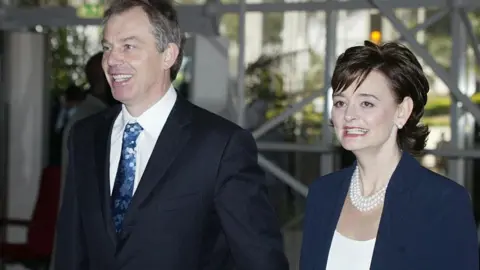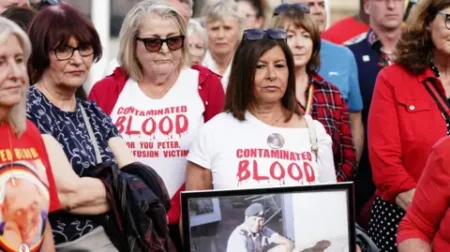The unveiling of previously classified documents from the National Archives has generated considerable public interest and concern regarding the financial dealings of former Prime Minister Tony Blair and his wife, Cherie. These files reveal that during their tenure at 10 Downing Street, the Blairs received significant discounts on designer clothing, amounting to tens of thousands of pounds. This revelation, while interesting, raises questions about the ethics of such financial arrangements and the implications for public perception.
Throughout the period from July 2001 to December 2002, Cherie Blair made substantial purchases of designer clothing, amounting to over £75,000. However, she reportedly paid only £31,000, benefiting from extensive discounts provided by various designers. An examination of the documentation indicates that these discounts could be valued at roughly £150,000 in today’s money. This discrepancy sparked concerns among Downing Street officials regarding compliance with emerging ministerial codes requiring the declaration of such benefits.
A notable aspect of the discounts stemmed from Cherie’s association with Carole Caplin, her personal trainer and shopper, who helped negotiate these deals. Among the notable designers from whom Cherie procured clothing were Nicole Farhi, Burberry, and the renowned British designer Paul Smith. The papers disclose that Cherie spent nearly £21,000 on items from Nicole Farhi but paid just over £8,000 for them. It raises questions regarding the propriety of such dealings by a sitting prime minister’s spouse, particularly in light of the public’s scrutiny and growing awareness of the need for transparency among holders of governmental office.
Internal documents from Downing Street suggest that officials, including Clare Sumner, a private secretary at No. 10, were aware of the delicate public perception surrounding the discounts. They advised the Blairs that they should consider repaying significant portions of the discounts to mitigate any potential backlash. According to Sumner, the magnitude of the discounts was such that they warranted concern over public optics and perceptions of propriety.
While the original justification for Cherie’s discounts included citing her role as a “career woman” needing clothes for public duties, the discourse surrounding these purchases sparked further debate. Suggestions were provided to label the arrangements as “commercial terms” given to other high-profile clients, thus framing it as a standard practice rather than a preferential treatment. Additionally, it was posited that Cherie often donated outfits to charities after her use, creating a narrative that she was not personally profiteering from her husband’s position as Prime Minister.
In an intriguing turn of events, Tony Blair himself communicated directly in a memo concerning the issue. The note, which carried the phrase “Speak to me,” indicated that he was aware of the conversation happening behind the scenes and highlighted his engagement in resolving the matter. The intention behind linked discussions also seemed aimed at producing clarity regarding whether any preferential treatment had taken place in these economic exchanges.
Despite these internal deliberations, it remains ambiguous whether the Blairs followed through on any refunds or acknowledged the advice provided. The documents revealed a lack of explicit mention of clothing discounts in their ministerial gift list submitted shortly thereafter, further complicating the transparency narrative.
The fallout from these revelations echoes beyond the Blair couple, resonating within contemporary political discussions, particularly surrounding Sir Keir Starmer, the current leader of the Labour Party. He faced criticism for accepting significant clothing allowances from outside benefactors, paralleling public scrutiny exercised during Blair’s premiership.
In summary, the emergence of the Blair’s designer discount dealings adds a complex layer to understanding public servants’ responsibilities regarding personal ethics and financial transparency. The discussion invites deeper contemplation about the intertwining of private benefits and public office, questioning how far personal freedom can extend without encroaching upon public trust. The need for accountability in relationships between politicians and commercial entities has never been more pertinent.











